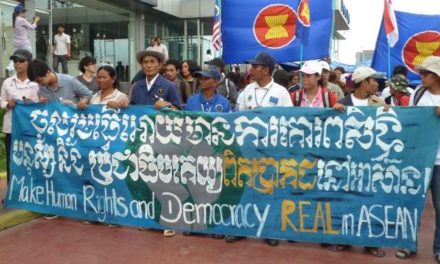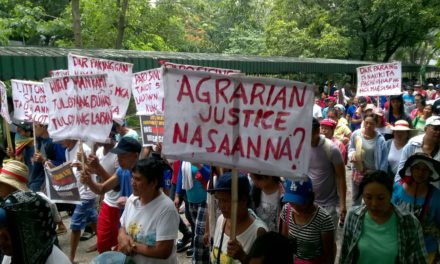Peoples statement on the 40th ADB AGM, Kyoto
7 May 2007
As the 40th Annual Governors Meeting (AGM) of the Asian Development Bank (ADB) concludes in Kyoto today, we, representatives from communities and civil society organisations from more than 20 countries reiterate our rejection of the institution. As in the past, deliberations in this AGM among the ADB’s most senior leadership were business as usual. The ADB plans to continue to aggressively promote neoliberal economic policies on the people of the Asia Pacific region and facilitate profitable investments for its shareholders and private capital. This is unacceptable to us. The ADB has no place in our vision for economic and social well-being in the Asia-Pacific region based on democracy, ecological sustainability and genuine cooperation among our peoples and governments.
We have come together with Japanese friends as the Peoples Forum on the ADB in Kyoto. But we recognise that the frontlines of the battle against the ADB and its destructive development model are not ADB AGMs. Communities are challenging the ADB across the Asia Pacific region: in Phulbari (Bangladesh), in Mae Moh (Thailand), in Manila (Philippines), in Chattisgarh and Kerala (India), in Melamchi (Nepal) in Chashma and Rawalpindi (Pakistan), in Colombo- Matara (Sri Lanka) and Phnom Penh (Cambodia). This is where the real struggles for people-friendly, sustainable development are rooted.
The representatives gathered in the Peoples Forum have raised many urgent issues in several events conducted as part of the Peoples Forum as well as debates within the premises of the ADB AGM:
-
Despite overwhelming evidence of the anti-poor impacts of the privatization of water and power, the ADB insists on promoting and financing privatization;
-
The ADB continues to fund lethal coal projects which not only exacerbate climate change, but have also caused deaths and sickness in communities living in the vicinity of the project areas;
-
ADB safeguard policies, which were the result of struggles and resistance by local communities in project affected areas, are now under major threat by ADB management and leadership;
-
ADB lending has resulted in creating illegitimate debt; loans have been used to impose harmful policies, finance destructive projects, support repressive governments, and contracted without democratic process.
Flawed Recipe for Change:
We reject the report by the Eminent Persons Group (EPG), ‘Towards a new Asian Development Bank in a new Asia’. The EPG calls upon the ADB to be relevant in the ‘New Asia’ by stepping up its efforts to promote policy frameworks conducive to private sector investments, aggressively pushing public private partnerships in infrastructure, more actively advancing regional integration and strengthening regional financial markets through trade and investment liberalization, and opening up new markets in the booming urban centers of Asia-Pacific. In other words, much more of the same but with greater focus and efficiency, and without the fetters of pretensions to poverty reduction as overarching goal.
The EPG’s recommendations are not surprising given its composition and mandate. This recipe for change is not in the interests of majority of the region’s peoples. It seeks to elevate to new heights what the ADB has been doing for the past forty years – using public funds to enrich private corporations and ensuring that the natural human, intellectual and innovative potential in the region is held hostage by international finance.
At the AGM, this report has already been challenged by some quarters for rejecting the poor and casting aside the weak. Genuine change for the ADB would entail a major shift in paradigm away from neoliberal dogma, democratization of the institution, introduction of rigorous national and regional performance standards and obligations, establishing mechanisms for accountability and compliance with these standards and obligations and with relevant national laws and
international covenants, bringing its operations under local and national democratic scrutiny and control. We will campaign in our respective countries for a rejection of the EPG report.
Our assessment:
40 years of the ADB has meant 40 years of destruction, debt and furthering corporate interests.





![[IN PHOTOS] In Defense of Human Rights and Dignity Movement (iDEFEND) Mobilization on the fourth State of the Nation Address (SONA) of Ferdinand Marcos, Jr.](https://focusweb.org/wp-content/uploads/2025/07/1-150x150.jpg)



